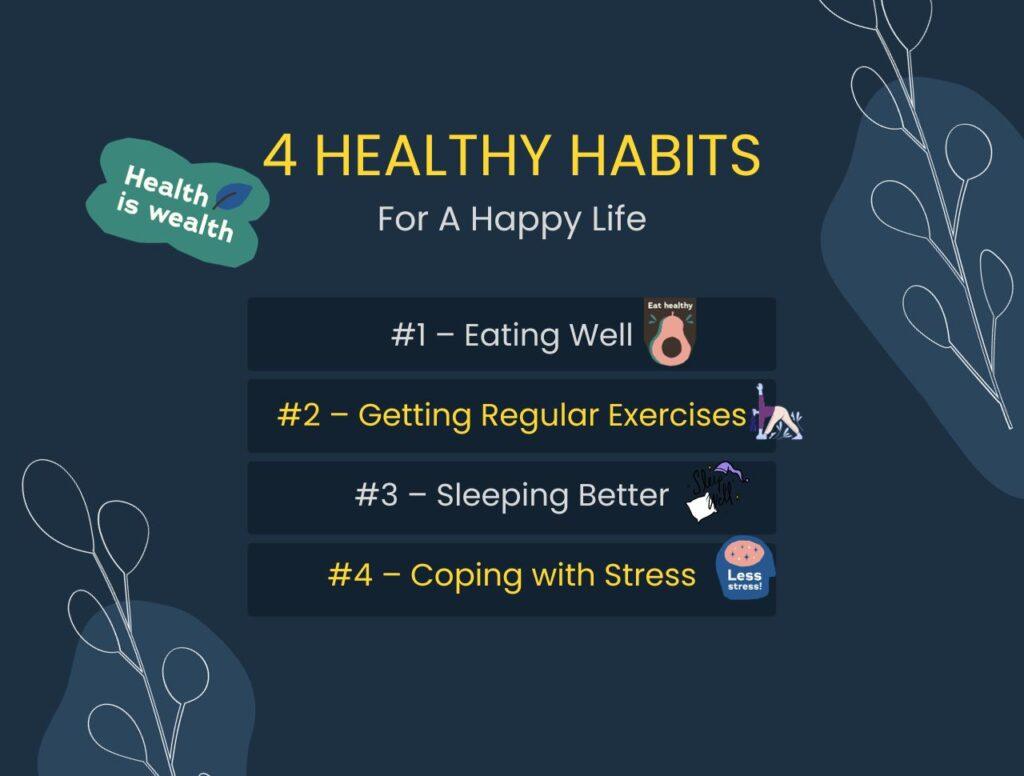Adopting healthy habits can have many benefits for your body and mind, such as reducing the risk of chronic diseases, enhancing your mood and energy levels, boosting your immune system, improving your sleep quality, and more. A healthy lifestyle is not only about looking good, but also about feeling good, both physically and mentally. This article will show you some of the healthy habits that can make you happier and healthier in 2024. These habits include: eating well, getting regular Exercises, sleeping better, and coping with stress.
Eating Well
One of the healthy habits that can enhance your health and happiness in 2024 is to follow a balanced and nutritious diet that provides adequate energy and nutrients for your body and mind.
A balanced and nutritious diet means eating a variety of foods from different food groups, such as fruits, vegetables, whole grains, lean proteins, healthy fats, etc. These foods can provide you with essential vitamins, minerals, antioxidants, fiber, and other substances that can support your healthy habits and prevent diseases.
For example, fruits and vegetables can help you lower your blood pressure, cholesterol, and inflammation levels. Whole grains can help you improve your digestion, blood sugar control, and weight management. Lean proteins can help you build and repair your muscles, bones, skin, and hair. Healthy fats can help you protect your heart, brain, and nerves.
Examples of Healthy Foods and Beverages:
Some examples of healthy foods and beverages that you can consume are berries, nuts, salmon, yogurt, water, tea, etc.
- Berries are rich in antioxidants that can protect your cells from damage and aging.
- Nuts are high in healthy fats that can lower your risk of heart disease and diabetes.
- Salmon is a great source of omega-3 fatty acids that can improve your brain function and mood.
- Yogurt is a probiotic food that can boost your immune system and gut health.
- Water is essential for hydration, metabolism, detoxification, and temperature regulation.
- Tea is a natural drink that can provide you with antioxidants, caffeine, and other compounds that can enhance your alertness, relaxation, and overall well-being.
To plan, prepare, and enjoy healthy meals and snacks, you can use some tips and tricks, such as using a food diary, reading nutrition labels, cooking at home, avoiding processed and junk foods, etc.
- A food diary is a tool that can help you track what, when, how much, and why you eat, and how you feel after eating. This can help you identify your eating patterns, habits, and preferences, and make changes if needed.
- Reading nutrition labels can help you compare and choose foods based on their ingredients, calories, nutrients, and serving sizes.
- Cooking at home can help you control what goes into your food, save money, and have fun.
- Avoiding processed and junk foods can help you reduce your intake of added sugars, salt, fat, preservatives, and other harmful substances that can cause weight gain, diabetes, heart disease, cancer, and other health problems.
Get Regular Exercises
Another healthy habit that can boost your health and happiness in 2024 is to engage in regular physical activity that improves your cardiovascular fitness, muscular strength, flexibility, and balance. Physical activity means any movement that makes your muscles work and burns calories.
Some of the benefits of exercising for your body and mind are:
Burning calories: Exercise can help you burn calories and fat, which can help you maintain or lose weight, improve your body composition, and prevent obesity-related diseases.
Strengthening muscles and bones: Exercise can help you build and maintain muscle mass and bone density, which can help you prevent osteoporosis, arthritis, sarcopenia, and fractures.
Enhancing mood and energy levels: Exercise can help you release endorphins, serotonin, dopamine, and other neurotransmitters that can improve your mood, reduce stress and anxiety, increase self-esteem and confidence, and fight depression.
Preventing diseases: Exercise can help you lower your risk of developing or worsening chronic diseases such as cardiovascular disease, diabetes, cancer, Alzheimer’s disease, and more.
Examples of Physical Activities:
Some examples of physical activities that you can do are walking, jogging, cycling, swimming, dancing, playing sports, doing yoga, etc.
- Walking is a simple and low-impact activity that can help you improve your cardiovascular health, burn calories, and reduce stress.
- Jogging is a moderate-intensity activity that can help you strengthen your muscles and bones, improve your endurance, and boost your metabolism.
- Cycling is a fun and eco-friendly activity that can help you tone your legs and core, improve your balance and coordination, and lower your blood pressure and cholesterol levels.
- Swimming is a great activity for all ages and fitness levels that can help you work out your whole body, improve your breathing and circulation, and relax your mind.
- Dancing is a creative and enjoyable activity that can help you express yourself, improve your flexibility and posture, and enhance your memory and cognitive function.
- Playing sports is a social and competitive activity that can help you develop your skills, teamwork, and sportsmanship, and have fun.
- Doing yoga is a holistic and spiritual activity that can help you connect your body, mind, and soul, improve your strength and flexibility, and practice mindfulness and meditation.
To incorporate exercise into your daily routine, you can use some tips and tricks, such as setting goals, finding a partner or a group, choosing activities that you enjoy, varying the intensity and duration, etc.
Sleeping Better
A third healthy habit that can improve your health and happiness in 2024 is to get enough good quality sleep that allows your body and mind to rest and recover. Sleep means the natural state of reduced consciousness and activity that occurs periodically in humans and other animals.
Some of the functions and benefits of sleep for your physical and mental health are:
Repairing tissues and cells: Sleep can help your body repair the damage caused by stress,
inflammation, infection, or injury, and regenerate new tissues and cells.
Consolidating memory and learning: Sleep can help your brain consolidate the information and skills that you acquired during the day, enhance your memory and learning abilities, and improve your creativity and problem-solving skills.
Regulating hormones and metabolism: Sleep can help your body regulate the hormones that control your appetite, growth, reproduction, stress response, immune system, blood sugar levels, etc. Sleep can also help you maintain a healthy metabolism and prevent obesity, diabetes, and other metabolic disorders.
Examples of How to Measure the Quality of Sleep:
Some examples of how to measure the quality of sleep are:
- Use a sleep tracker or a sleep diary to record how long and how well you sleep, how often you wake up during the night, how refreshed you feel in the morning, etc.
- Following the recommendations of the National Sleep Foundation, which include four indicators of good quality sleep: falling asleep within 30 minutes or less, waking up no more than once per night, being awake for 20 minutes or less after initially falling asleep, and sleeping for at least 85 percent of the total time that you are in bed.
To optimize your sleep hygiene and environment, you can use some tips and tricks, such as following a regular sleep schedule, avoiding caffeine, alcohol, nicotine, and heavy meals before bedtime, dimming the lights, turning off electronic devices using relaxation techniques, etc.
Coping with Stress
A fourth healthy habit that can enhance your health and happiness in 2024 is to manage stress effectively by coping with stressors positively and reducing their impact on your well-being.
Stress means the physical and emotional response that occurs when you perceive a threat or a challenge that exceeds your resources or abilities.
Some of the sources and effects of stress on your physical and mental health are work, family, finances, health issues, etc., and how stress can cause headaches, muscle tension, fatigue, anxiety, depression, etc. Stress can also impair your immune system, increase your blood pressure, and affect your sleep quality and appetite.
Examples of How to Cope with Stress:
Some examples of how to cope with stress positively and reduce its impact on your well-being are identifying and avoiding stressors, seeking social support, expressing emotions, practicing mindfulness, meditating, etc.
- Identifying and avoiding stressors means recognizing what causes you stress and finding ways to eliminate or reduce them. For example, you can delegate tasks, set boundaries, say no when necessary, or change your environment.
- Seeking social support means reaching out to others who can help you cope with stress, such as friends, family, colleagues, or professionals. They can provide you with emotional, practical, or informational support.
- Expressing emotions means acknowledging and releasing your feelings healthily, such as talking to someone, writing in a journal, crying, or laughing.
- Practicing mindfulness means paying attention to the present moment without judgment or distraction. It can help you calm your mind, relax your body, and increase your awareness and acceptance.
- Meditating means focusing your attention on a single object, such as your breath, a word, or a sound. It can help you reduce stress, improve your concentration, and enhance your well-being.
Tips and Tricks on How to Prevent Stress:
Some tips and tricks on how to prevent stress from accumulating and build resilience are prioritizing tasks, delegating responsibilities, taking breaks, pursuing hobbies, etc.
- Prioritizing tasks means organizing and managing your time and energy according to the importance and urgency of your tasks. It can help you avoid procrastination, overload, and confusion.
- Delegating responsibilities means assigning or sharing some of your tasks or duties with others who can perform them better or faster. It can help you reduce your workload, stress, and pressure.
- Taking breaks means pausing or stopping your work or activity for a short period. It can help you refresh your mind, relax your body, and restore your energy.
- Pursuing hobbies means engaging in activities that you enjoy or are passionate about. It can help you express yourself, have fun, and relieve stress.
Adopting healthy habits in 2024 can help you achieve a happy life. These habits are: following a balanced and nutritious diet, engaging in regular physical activity, getting enough and good quality sleep, and managing stress effectively. These healthy habits can help you improve your physical and mental well-being, prevent diseases, enhance your mood and energy levels, boost your immune system, improve your sleep quality, and more. By following these healthy habits, you can make 2024 the best year of your life. So, what are you waiting for? Start today and make your health goals come true!






